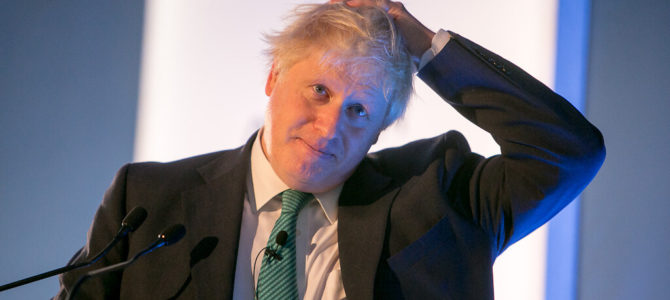
Brexit—both the process and the legislation continuing that process—remain officially “in limbo.” But Boris Johnson’s fate as prime minister may not remain in limbo for much longer.
Those dual outcomes stem from a series of somewhat contradictory developments in the House of Commons on Tuesday. For starters, MPs approved the second reading of the Withdrawal Agreement Bill—the legislation that would make changes to British law necessary to bring about Brexit—on a 329-299 vote. Not only did Johnson achieve changes to the deal his predecessor, Theresa May, negotiated with the European Union, a feat many thought impossible, but Parliament had ratified the deal in principle, a feat May never got close to realizing.
Unfortunately, however, the devil always lies in the details. Johnson found that out 15 minutes later.
After approving the Brexit bill in principle, MPs voted against the government’s timetable for considering the legislation by a 322-308 margin. To meet the current Brexit date of October 31—a date Johnson pledged to meet “do or die”—Johnson’s government proposed having the House of Commons complete its line-by-line scrutiny of the legislation in two days this week. (The House of Lords would have considered the bill later this week and next week, to allow it to receive royal assent by October 31.)
Despite having spent more than three years debating Brexit, members of Parliament rejected the accelerated timetable. Some of course still hope to reverse Brexit entirely. Others fear both the political and practical consequences of rushing detailed legislation through so quickly—the British equivalent of Nancy Pelosi’s infamous “We have to pass the bill so that you can find out what is in it” comment regarding Obamacare.
The Northern Ireland secretary didn’t help matters on Monday, adding to the sense of confusion and haste when he first claimed that Northern Irish firms wouldn’t have to fill out customs forms when sending goods to the rest of the United Kingdom, only to correct himself later in the day. (Because it shares an island with the Republic of Ireland, which will remain in the EU, the revised deal will apply EU customs rules to Northern Ireland, but not the rest of the United Kingdom.)
Following the defeat of the “programme motion” governing debate on the Brexit bill, Johnson announced he would pause to consider his options. Procedurally, the bill remains “in limbo”—which prompted diversions by several MPs into “the realms of metaphysical abstraction”—but sources within the government and 10 Downing Street suggest that Johnson will now renew his push for a quick general election.
Not all voices within the Conservative Party agreed with his decision. Following the government’s announcement of a pause to the Brexit bill, Conservative backbench MPs suggested that lawmakers should continue their work. Even if they could not enact the bill by October 31, the MPs argued, Parliament should continue to work with all deliberate speed, obtaining only a short extension of the Brexit deadline and keeping Parliament in session until they could secure passage.
Opposition MPs, on the other hand, called Johnson “churlish” following the procedural defeat, accusing him of taking his proverbial ball and going home. Labour Party leader Jeremy Corbyn said he would gladly discuss laying out an alternative timetable to consider the legislation, albeit one not quite as accelerated as the one Johnson proposed.
Therein lay the true problem for Johnson, and his reason for caution—a Greek bearing gifts. Corbyn opposes the Brexit agreement; most of his party (albeit perhaps not Corbyn himself) wants to cancel Brexit altogether. Corbyn and Johnson both saw the same dynamic in Tuesday’s vote: While a majority of MPs now support the current Brexit bill in principle, they might object to some key details of the legislation. Opposition MPs could well derail the bill by cobbling together ad hoc majorities to make changes to the bill—for instance, demanding a second referendum, for the public to ratify or reject Johnson’s agreement—just as they killed the government’s procedural timetable on Tuesday.
Johnson’s government has no working majority. In fact, it has no majority in the House of Commons at all. Trying to enact one of the most far-reaching and consequential pieces of legislation Parliament has ever seen via a minority government sounds like a recipe for disaster. MPs could spend weeks (or longer) considering details of the bill, tying down the government like Gulliver, and pass amendments that the government could never get the European Union to accept.
With approval for an accelerated debate in the House of Commons, Johnson could have punched through the obstacles and gotten Parliament to ratify his deal. (He, to say nothing of May, could have gotten a Brexit bill through but for May’s decision to call a snap election in 2017—which cost the Conservatives 13 seats in Parliament, and their majority.)
But the procedural defeat made passage of the legislation by October 31 next-to-impossible regardless, and made Johnson think himself better off for the long legislative slog needed to pass a Brexit bill by going to the country and winning an outright majority in Parliament. Or so he hopes.
European Council President Donald Tusk said he would recommend extending the October 31 Brexit deadline; his comments implied he would accept Britain’s recommendation of a three-month extension. If and when that three-month extension happens, Johnson would likely try to maneuver his way towards a general election.
If opposition parties agree—which they said they would once a “no deal” Brexit on Halloween was off the table—Brenda from Bristol and the rest of the British electorate will get to decide the fate of Johnson, and of Brexit, as soon as November 28. Anglophiles and Brexiteers take note: You could have something other than football to watch with your meal this Thanksgiving.









